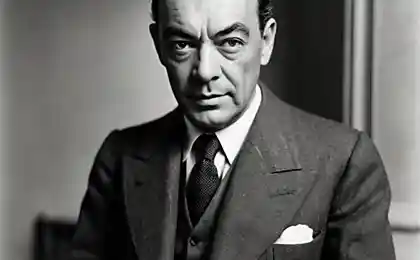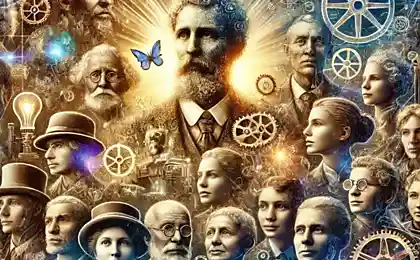314
How Purpose Transforms Existence into Life

At the Crossroads of Choice: The Way of Existence or Life with a Purpose
In the flow of everyday life, it is easy to lose a sense of direction, turning your days into a mere existence—a mechanical movement from one point to another. However, it is the emergence of a conscious goal that can transform this existence into a full, fulfilling life. As Nietzsche said, “He who has a why to live will endure almost any how.” Purpose gives our lives a special dimension of depth, meaning and direction.
“The goal attained is left behind and therefore loses its value, but adds to the momentum of life, which strives further and further.”
This thought encapsulates the paradox of human existence: we are driven by achievement, but the true value lies not so much in the goal achieved as in the momentum it imparts to our lives. Let’s understand why goals are so important and how to build relationships with them in order to live a full and not just existing life.
Existential Transformation: From Existence to Life
Existence can be defined as a simple biological presence in the world – we breathe, eat, sleep, perform basic functions. But life begins where direction appears. The goal acts as an internal compass that transforms inert existence into rich movement. Psychologists call this state "flow" - when a person is completely immersed in meaningful activities associated with movement towards a goal.
Neurobiological studies show that having a goal activates specific areas of the brain associated with satisfaction and motivation. With purposeful activity, the brain secretes dopamine, a neurotransmitter associated with feelings of pleasure and motivation. Interestingly, the maximum release of dopamine occurs not at the time of reaching the goal, but in the process of moving towards it, especially when we see intermediate results.
According to Gallup research, people with clear life goals have a 64% higher level of involvement in life and 55% higher scores of psychological well-being compared to those without specific goals.
The Anatomy of Purpose: Why Not All Goals Are Equally Useful
However, not every goal can turn existence into reality. True transformation requires quality goals. Psychologist Mihai Csikszentmihalyi identified several criteria for “good” goals:
- Automaticity The goal should be valuable in itself, not just for the sake of external reward.
- Optimal level of complexity The goal must be difficult enough to challenge, but achievable
- Personality congruence The goal should be consistent with the internal values of the person
- Transcendence The best goals go beyond personal satisfaction and involve contributing to something more.

The Anatomy of Goals: The Structure That Transforms Existence
Pyramid of Goals: From Existential to Tactical
For a full life, a system of goals of different levels is necessary:
- Existential goals Answer the question “Why do I live?”
- Strategic objectives Designed for years, form the direction of life
- Tactical objectives - implemented over months and weeks
- Operational objectives daily tasks leading to larger goals
The Paradox of Goal: Why Finishing is a New Start
The goal does lose some of its value, a psychological phenomenon known as hedonic adaptation. Our brain quickly gets used to the achieved result, and the initial euphoria is replaced by a new state of normal. Studies show that people who win large sums in the lottery return to their original level of happiness after a year.
But this is not a tragedy, but the wisdom of evolution. This goal creates an important psychological impulse, a state of competence and confidence that psychologists call “self-efficacy.” Each achieved goal becomes a springboard for more ambitious aspirations, expanding the boundaries of the possible.
“Happiness is not in achieving a goal, but in moving toward it.” Leo Tolstoy.
The cyclical nature of goal-setting
It is important to understand the cyclical nature of goal-setting. A meaningful life involves not just achieving a single goal, but a continuous process of renewing goals. The achieved goal should become the starting point for new aspirations - only in this way the dynamics of internal development is preserved.
Current research in positive psychology confirms that people who practice regular goal updates show higher rates of psychological well-being and resilience. Martin Seligman, the founder of positive psychology, notes that the meaning of life arises precisely from this continuous movement from one meaningful goal to another.
How to correctly integrate goals into life: practical recommendations
Practical recommendations for goal-setting
- Use the Life Balance Wheel technique Identify 8 key areas of life and set goals in each of them
- Apply the decomposition method Break down big goals into smaller tasks with specific deadlines
- Practice visualization Regularly present the process of achieving the goal and the end result
- Implement the Three Horizons Rule Always have goals for the next week, month and year.
- Use the “progressive microtarget” method Small but regular steps create a powerful cumulative effect.
- Keep a goal diary Track progress and adjust your strategy as needed
- Create a system of reminders Return to your goals regularly to keep your focus.
How to Avoid Targeting Traps
When working with goals, it is important to avoid common mistakes that can turn goal setting from a developmental tool into a source of stress.
- Avoid excessive focus on the outcome To the detriment of the process - learn to find pleasure in the way
- Do not associate self-esteem solely with achievement. You are valuable regardless of your success.
- Avoid setting goals based on external expectations Focus on the internal compass.
- Don’t sacrifice the present for the future. Balancing long-term goals and living the moment is critical

The spiral of transformation: each goal achieved becomes a stepping stone to new heights
The Existential Potential of Goals: From Biology to Philosophy
It is interesting that goal-setting brings a person to a qualitatively new level of existence, transforming biological survival into existential completeness. Existentialist philosophers, such as Jean-Paul Sartre, have noted that man is distinguished from other beings by the ability to project himself into the future, creating the meaning of his existence through purposeful actions.
Modern neurobiological research confirms that the prefrontal cortex, which is responsible for planning and goal-setting, is one of the most evolutionarily young brain structures, making goal-setting a uniquely human ability.
According to a study published in the journal Psychological Science, people with a clear purpose in life show higher scores of cognitive flexibility, stress tolerance and live an average of 7 years longer than their peers without clear life goals.
Goals as a source of existential sustainability
Victor Frankl, the founder of logotherapy, found that people who were able to maintain meaningful goals even in the most difficult conditions (for example, in concentration camps) showed amazing resistance to psychological trauma. The goal creates an inner core on which a person can rely in times of crisis.
Modern research in the field of neuroplasticity shows that targeted activity not only improves psychological state, but also stimulates the formation of new neural connections, slowing cognitive aging and increasing the adaptive abilities of the brain.
Time to act!
Don’t put off setting your goals until tomorrow. Take 30 minutes today to determine what will make your existence a fulfilling life.
From Theory to Practice: Algorithm of Transformation
For those who are ready to transform their existence into a meaningful life, we offer a practical algorithm for transformation through goal-setting:
- Conduct an audit of life spheres Assess the level of satisfaction in different areas of life and determine where development is needed.
- Formulate a personal mission A brief but succinct statement about how you want to contribute to the world
- Identify value-based goals Goals aligned with your core values
- Create a Progress Tracking System Regular assessment of progress towards the goal helps to maintain motivation
- Create rituals to remind you of your goals Weekly reviews, visual reminders, communication with like-minded people
- Practice reflecting on achievements Conscious understanding of the path passed strengthens the impulse to further development
Conclusion: Eternal movement forward
A life filled with goals is like a river, which, reaching one sea, does not stop, but continues its journey to new horizons. The goals that have been achieved are indeed behind us, but their true value lies in the momentum that they give us.
The transformation of existence into life through goal-setting is not a single act, but a continuous process of self-renewal. Each goal reached expands the horizons of the possible, opening new heights for us. In this continuous striving forward lies the true fullness of human life.
Glossary of terms
Automaticity
From the Greek "auto" (self) and "telos" (goal) - the property of activity to be valuable in itself, and not only as a means of achieving external results.
Hedonic adaptation
Psychological phenomenon in which people quickly return to a basic level of happiness after significant positive or negative events.
dopamine
A neurotransmitter involved in the brain’s reward system and associated with motivation, pleasure, and purposeful behavior.
Congruence
Consistency between different aspects of the personality, in the context of goal-setting - the correspondence of goals to the inner values and beliefs of a person.
Logotherapy
The direction of psychotherapy, developed by Viktor Frankl, focuses on the search and realization of meaning as a central motivational force in human life.
Neuroplasticity
The ability of the brain to change its structure and function as a result of experience, learning, and purposeful activity.
Resilience
Psychological stability, the ability to effectively adapt to stressful situations and recover from difficulties.
Self-efficacy
The concept, developed by Albert Bandura, denotes the belief in one’s ability to successfully complete tasks and achieve goals.
Flow status
A term coined by Mihai Csikszentmihalyi, describing a state of total immersion in an activity accompanied by high concentration and pleasure.
Transcendence
Going beyond an individual’s experience, connecting with something greater than a personal existence—ideas, values, or community.
8 Reasons Why You're Afraid of Other People's Disapproval
“A man should smell like sweat, not flowers”: 5 myths about men’s hygiene























